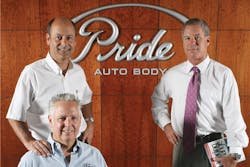You could say that Randy Stabler and Robert Turchan built a business from books. The duo, who have been friends since first grade, were high school hobbyists when it came to fixing cars—starting with their own rides, then eventually buying others to fix up and sell. They learned the craft not at the hands of some local pro but from books they checked out of the library.
When they graduated, they continued their book learning in the traditional way: by attending college. Stabler studied political science, Turchan studied biology. Degrees in hand, they faced that “what now?” conundrum so common among recent college grads, but rather than look for work in their respective fields, the friends turned to their hobby.
Coming from what Stabler describes as “modest upbringings,” each wanted a career with financial stability, but worried that differentiating themselves from their fellow college grads in, say, law school, might be difficult. But they knew how to fix cars, and thought that with their college educations they “might have a leg up on a lot of the competition in the collision repair business,” Stabler says. So in 1983 they rented a 4,000-square-foot building in Van Nuys, Calif., and started Pride Auto Body. Those early days were rough. “We were in business for three weeks before we had a telephone,” Stabler says. “There were three rows of lights and we only turned one row on to conserve money. We were watching every penny.”
—Randy Stabler, Co-Owner, Pride Auto Body
From the beginning, Stabler and Turchan wanted to be the best in the business. Do the highest-quality job for the customer and everything else will take care of itself, they thought. But even then the two neophyte entrepreneurs showed a knack for business.
“If quality is going to be our differentiator, who is going to value that?” Stabler recalls thinking. The answer: luxury car dealers. “We were fixing anything we could get our hands on, and we were doing it for next to nothing, but we targeted a BMW dealership and aggressively marketed to them over a two-year period. And we earned their trust.” And kept it too, incidentally; that dealership is still a customer.
The partners also invested in equipment that was almost unheard-of at the time, like downdraft spray booths and dedicated benches, which helped them live up to the high-quality reputation they were marketing.
Ten years later, they expanded to a second location in Valencia. The purchase of two existing shops, in 1999 and 2000, gave them their third and fourth locations. Then, in 2005, they merged Pride Auto Body with Ford Auto Body, a multi-store operator in the San Fernando Valley owned by Jay Russell. (Russell is now a partner in Pride Collision Centers Inc.) Capping their expansion efforts—for now, anyway—was the 2006 opening of a facility dedicated to used-car reconditioning work for dealers, and the February 2008 purchase of a large dealer-owned body shop.
While Stabler and Turchan were initially drawn to the collision repair business in part because of its scalability, Stabler never expected Pride to become a multi-store enterprise. What the partners did envision was getting it to the size where they would oversee repairs and take on managerial roles. “We started out performing all of the repairs ourselves,” he says, “[but] we knew from the beginning that we wanted to use our education to develop processes and manage the business enterprise.”
In fact, Stabler credits education—both formal (their college degrees) and informal (their self-taught forays into collision repair and entrepreneurship)—for Pride’s success.
Business tomes like Peter F. Drucker’s classic The Effective Executive and Marcus Buckingham and Curt Coffman’s First, Break All the Rules helped Stabler learn about how businesses succeed or fail. Continuing education played a role too: In 2000, Stabler and Turchan enrolled in a management consultant class called MAP (Management Action Programs). “It brought clarity and systemization to getting things done,” he says. “There are three tenets to MAP: define your goal; create a written action plan to achieve the goal; and establish a timeline for completion of the action items.”
Today, they oversee a seven-location business that did $18 million in sales last year. Not bad for two guys who admit they didn’t know much about the business when they started. So how’d they do it?
Strategic Thinking
Pride’s initial expansion was relatively uncomplicated: There were two shops and two partners. But that changed with their third location. With no way for an owner to each focus on just one shop, the pair needed to streamline back-office elements, make sure their employees were productive and ensure their customers were happy.
For starters, they took the administrative, HR, IT and accounting functions out of the body shop and off-site into a centralized office location, leaving the collision repair shops free to focus on writing estimates, buying parts, servicing customers and fixing cars.
“Centralizing those services was a critical difference in our thought process,” Stabler says. “It forced us to figure out how [to] manage all those processes…and really enabled us to think about structuring our business to be profitable.”
They also built a robust computer management system that enabled them to gather information about the shops and their progress without having to be on-site at every location, every day.
Robust Record-Keeping
Stabler and Turchan have been diligent record keepers from the beginning. “Coming from school, we always had report cards,” Stabler says, “and so we tried to make sure we had a financial report card on just about everything that we did. Most young businesses don’t analyze a financial statement and run their business based on performance metrics, but we did.”
“Many businesses know if they are making money or losing money but can’t pinpoint where they are profitable or where they are losing money,” he continues. “We had these numbers early and have continued to expand that in our business.”
On a daily basis, Pride Auto Body shops measure customer satisfaction scores, the number of repair orders generated, the number of repair orders delivered, the number of estimates written, the number of estimates captured, the cycle time of cars delivered, the average hours per day for cars delivered, monthly sales projection based on cars delivered and number of days left in the month, the number of DRP assignments received, alternate parts usage and the number of supplements.
Pride was an early adopter of computer managment systems so it has had many years to use them to measure finite aspects of their business. But Stabler also credits Pride’s involvement with the Fix Auto network of shops and its affiliated technology company, Cyncast.
“Our involvement with Fix Auto and Erick Bickett, who brought the Fix Auto USA concept to the United States, has been a tremendous benefit to our company,” he says. “[They] have been the trail blazers for sophisticated measurement tools in our industry, and we owe a lot to that association and relationship.”
Pride Auto Body is not branded as a Fix Auto Shop—“We have developed our own brand in our marketplace,” Stabler says—but Fix Auto provides Pride with a 24-hour call center for customer satisfaction calls, estimate follow-up calls and centralized DRP assignment handling. In addition, Fix provides a data warehouse to analyze Pride’s performance numbers and provide performance reports that compare Pride to other Fix shops.
Pride is also a member of two other performance groups that enable it to compare financial performance and best practices with other shop owners around the country.
“Records and report cards are no good if you do not have a benchmark to compare them to,” Stabler says.
Record keeping also builds transparency in the business. Pride shares its financial details with employees, and rewards them for the company’s performance: All managers have a component of their compensation based on the net operating profit of their store.
Keeping an “Employee Mentality”
For many entrepreneurs, the benefits of business ownership include being your own boss—and the inherent perks that go along with it. But Pride’s founders act more like employees than owners. They don’t take personal phone calls at the office, they don’t hire family members, they park where their employees park, and they don’t take off to play golf on the first sunny day of spring. It’s a mentality they feel is helping them build a business that will have a lasting legacy.
Operating the company with that kind of employee mentality builds a happy work force, too. “When every action of the owners [is] consistent with the core values that they profess, employees get energized,” Stabler says. “Employees then know that they are part of a team and they are working for a purpose.”
Edwin Gonzalez, manager of Pride’s Valencia location and a 13-year veteran of the company, calls Stabler “a team player” and says he’s loyal to Pride “because I’m continually learning, and Randy gives me the opportunity to learn what he knows. If I ask him for advice, he’s there. If there’s training or schooling that we need to improve the business, he’s open to that. And he has some level of trust in me. I manage the store, but I feel like it’s my store and I treat it like it’s my store, and the results at the end of the month show that.”
Stabler observes, however, that professional training is a problem area in the industry right now. “People aren’t using I-CAR classes enough,” he says. “At our company, we try to have I-CAR classes in the evening, but that’s a long day for most people. Shops just don’t have the profit to be able to have a technician leave the store for two weeks and pay them. We all want to spend money professionally training our staff, but it’s very costly. We don’t have margins to do that, because we don’t charge enough as an industry.”
An Industry to Invest In
To get profit margins up, Stabler encourages other shop owners to take a good, hard look at their income and expenses. “Hire an outside board of directors and look at your shop as a business,” he suggests. What’s your actual profit margin? If you went public with your business, could you expect people to invest in it?
“If people aren’t willing to invest in your business, then your business isn’t profitable enough, or your industry isn’t profitable enough. The only way you know your industry is a viable one is if Wall Street is willing to invest in it. The reason they don’t invest is because returns aren’t big enough,” he says. He adds, this time emphatically, “We don’t charge enough.”
Moving the Business Forward
Pride Auto Body is constantly looking at what will improve its bottom line. Of course, what was revolutionary back in the day—measuring business metrics, investing in the latest equipment—is now business-as-usual. “Differentiating our company today is more difficult than it was 20 years ago,” Stabler admits.
One thing that could help is Pride’s relationship with vehicle manufacturers. Stabler says the company has met the certification standards required by Jaguar, Toyota, Lexus, BMW, GM, Volvo, Mercedes and Audi—a substantial investment in both time and money, but one that he feels gives Pride “a decided edge” over many of its competitors. “We feel that our relationship with dealers and these certification standards will be a key differentiator for us in the future,” he says.
“Let’s face it, from the insurance company perspective, we are a commodity business,” he says. “All of the body shops install the fenders the same way and basically apply the paint in the same way. The only way we can differentiate ourselves is in the quality of our facilities, the quality of our repair, and the quality of the customer experience.”




